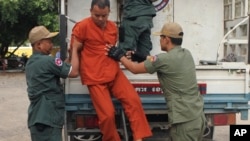Following the 25-year sentence for an unlicensed doctor who caused an outbreak of HIV, rights, development and legal experts consider whether justice was served.
The questions revolve around how many years imprisonment should be meted out by the court in a case that may have been more negligence than homicide and where ultimate responsibility for the outbreak lies.
Yem Chroeum, 55, was found guilty of running an illegal clinic and, according to the verdict, “intentionally causing HIV transmission to other people,” through the reuse of dirty syringes and needles.
Up to 280 people were infected with HIV in Roka village, most of them through his clinic, officials say. Eleven people have died as a result of the virus.
Sok Sam Oeun, a lawyer at the Cambodian Defenders Project, said the prison sentence may have been too harsh, given that the actions of the defendant were seemingly not premeditated or homicidal.
“Did he have intention to do this, meaning an intention that he wanted other people to die, or did he do it unintentionally?” Sok Sam Oeun said. “If he did it carelessly, it wouldn’t be a planned murder. It could be merely an unintentional murder.”
Am Sam Ath, chief investigator for the rights group Licadho, said the damage caused by Yem Chroeum was widespread, and the court may have sought to assuage the suffering of family members. On the other hand, Yem Chroeum’s family may see it as harsh.
“Typically, the family members of the victims still think it’s not justice for them but this is the discretion made by the court,” he said.
Authorities in Battambang also share some of the responsibility, he said, because they allowed the unlicensed clinic to operate.
“This is an experience or a lesson learned for the Ministry of Health in checking and keeping track of all the professional activities of medics, and all these people must receive license,” he said. “But we can’t let this happen again.”
Thida Khus, executive director of Silaka, a development organization, told VOA Khmer that responsibility for the outbreak was also systemic, occurring in a place where it can be hard to find healthcare. But even so, the 25-year sentence for Yem Chroeum will serve as a warning to other medical practitioners, an unknown number of whom continue to operate across the country.
“This case has ended, but the responsibility is on the government,” she said. “Why did the government allow this to happen? What should we do to prevent this from happening again?”
Health Minister Mam Bunheng declined to comment on the court verdict itself, but he told VOA Khmer that the ministry is working to improve inspections of private clinics. As a result, “we also filed complaints to the court in some cases that were not abiding by the law, and punishments have been made,” he said. “After this, we’ve enhanced the healthcare service for the general public.”








